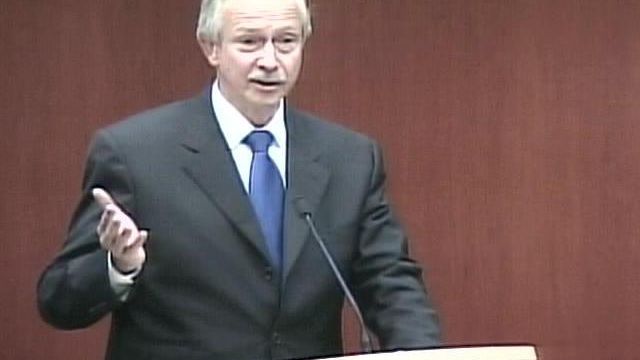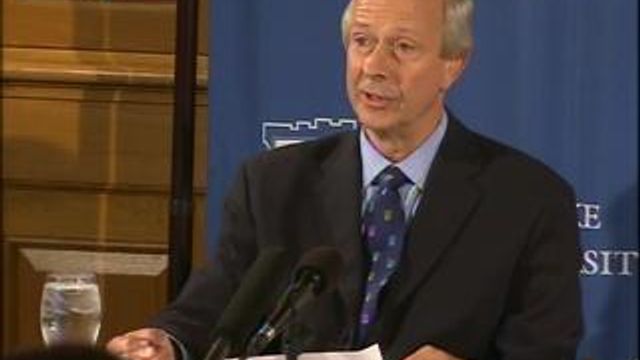Local News
Duke President Apologizes to Lacrosse Players
Duke University President Richard Brodhead apologized Saturday for not better supporting the lacrosse team after three players were falsely accused of rape last year.
Posted — UpdatedDURHAM, N.C. — Duke University President Richard Brodhead apologized Saturday for much of the university's actions during the highly publicized yearlong rape investigation involving the school’s highly ranked lacrosse team.
"Given the complexities of this case, getting the communication right would never have been easy," Brodhead said. "But the fact is that we did not get it right, causing the families to feel abandoned when they were most in need of support. This was a mistake. I take responsibility for it, and I apologize for it."
Speaking at a Duke law school conference, Brodhead made his first public remarks about the case since charges against David Evans, Collin Finnerty and Reade Seligmann were dropped. The conference, "The Court of Public Opinion," focused on the ethical obligations of the media, legal system and colleges during high-profile criminal cases.
"Having become one of America's principal forms of shared public life, these cases highlight crucial problems of our culture – problems of achieving justice in a media-saturated society, problems of fundamental fairness to individuals, and problems in the way the American public is informed and misinformed about the world we live in," he said.
The Duke case, he said, revealed a larger societal problem: "How to create and maintain the optimal balance between the independence of the legal system and protection of individuals from false prosecutions."
Brodhead announced that Duke administrators will review its procedures on how to react "when students are tied to serious criminal charges." The university will also host a national conference for educators to discuss best practices for such instances.
Brodhead said the entire case – from the accusations in March 2006 to the ongoing aftermath – was tainted by "instant, uncritical certainty that fed on itself." Media reports and statements by legal officials, he said, "confirmed and reconfirmed public certainty that an outrage had occurred."
Evans, Finnerty and Seligmann were charged after an exotic dancer claimed she was raped at a party hosted by three lacrosse players. Even as the case seemed to unfold, then-Durham District Attorney Mike Nifong pursued charges of first-degree rape, kidnapping and sexual assault until December, when he dismissed the rape charge against the three men.
Less than a month later, he recused himself from the case, and asked for a special prosecutor to handle it. On April 11, 2007, Declaring the indicted former players innocent victims, North Carolina Attorney General Roy Cooper dropped the case after special prosecutors found no evidence to proceed.
In the weeks after the allegations surfaced, however, Brodhead suspended the lacrosse team for the season, and longtime lacrosse coach Mike Presser was forced to resign.
Eighty-eight Duke professors and staff also endorsed a full-page advertisement in the student newspaper, which some say they feel were convicting the lacrosse players before anyone was charged.
Brodhead said Saturday he staked out the university's three positions on the lacrosse case: That there was "no place in our community" for that type of alleged crime, that the accused students were "entitled" to "the presumption of innocence" and that the case should be "entrusted to the criminal justice system for its resolution."
Brodhead took responsibility for Duke's actions and statements, but distanced himself and the institution from the behavior of individual faculty members, saying “ill-advised" and divisive statements by some faculty were not "expressions of the university as a whole."
The Duke lacrosse case revealed the "serious limits" of the criminal justice system, he said.
"Our justice system – the best in the world – is only as good as the men and women who administer it," he said. In this case, "a rogue prosecutor on the loose" undermined the system as he "presented false allegations as true, suppressed contrary evidence, and subverted the process he was sworn to uphold."
Brodhead said "the deepest lesson" he learned during the case: "The scariest thing, to me, is that actual human lives were at the mercy of so much instant moral certainty, before the facts had been established."
He cited "the danger of prejudgment" and urged people to remember the case "as a call to caution in a world where certainty and judgment come too far quickly."
• Credits
Copyright 2024 by Capitol Broadcasting Company. All rights reserved. This material may not be published, broadcast, rewritten or redistributed.






